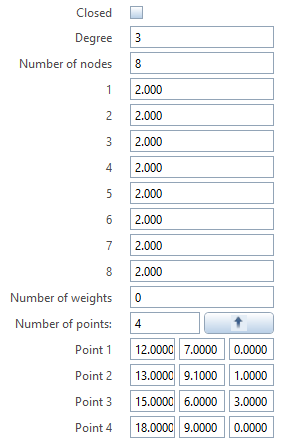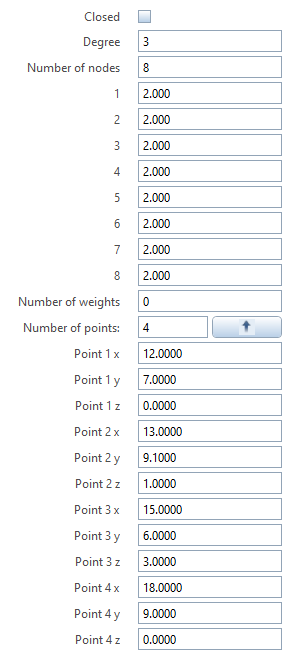BSpline3D¶
The value type BSpline3D is used to create the input controls for a 3D bspline

Syntax¶
<Parameter>
<Name>BSpline3DRow</Name>
<Text>_</Text>
<ValueType>Row</ValueType>
<Parameter>
<Name>BSpline3</Name>
<Text>Point</Text>
<Value>BSpline3D(IsPeriodic(0)Degree(3)Weights()Knots(0,0,0,0,1,1,1,1)Points((12000,7000,0)(13000,9100,1000)(15000,6000,3000)(18000,9000,0)))</Value>
<ValueType>BSpline3D</ValueType>
</Parameter>
</Parameter>
If each coordinate is to be displayed in a separate line, the syntax looks like this
<Parameter>
<Name>BSpline3</Name>
<Text>Point</Text>
<Value>BSpline3D(IsPeriodic(0)Degree(3)Weights()Knots(0,0,0,0,1,1,1,1)Points((12000,7000,0)(13000,9100,1000)(15000,6000,3000)(18000,9000,0)))</Value>
<ValueType>BSpline3D</ValueType>
</Parameter>
The result is

Value unit¶
The unit for the default values assigned to the coordinate values in <Value> is mm.
Example¶
The implementation of the BSpline3D value type is described in the example GeometryElementsInput located in
…\etc\Examples\PythonParts\PaletteExamples\GeometryElementsInput.pyp…\etc\PythonPartsExampleScripts\PaletteExamples\GeometryElementsInput.py